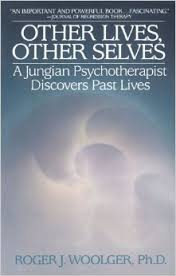 Reviewed by Clyde H. Reid, Th.D.
Reviewed by Clyde H. Reid, Th.D.
In JRT Issue 4, Fall 1987
This is an important and powerful book. Even as Shirley MacLaine’s explorations into reincarnation are appealing to many people because of who she is, so this seminal book by Roger Woolger deserves attention because of what he is—a brilliant, original thinker, classically trained, psychologically grounded, and widely respected.
Dr. Woolger has shared his extensive experience with the power of past-life therapy through fascinating case studies, by setting PLT in the context of modern psychology and religious traditions, and by using his own analytic powers to organize creative ways of looking at the data and its patterns.
Roger becomes the first Jungian analyst to come out of the closet and systematically analyze PLT as an important tool for healing. (Erlo van Waveren wrote of PL experiences and dreams personally and poetically in Pilgrimage to the Rebirth). Roger relates PLT to Jungian thought and goes beyond, studying it in relation to Tibetan Buddhism and other systems as well.
Woolger is a thinker, yet his writing and reflections come out of personal experience and data from live cases, not theoretical propositions. In this respect he reminds us of Jung, who theorized from data rather than creating a theory and then finding data to support it. Roger tells us of his own journey into past-life experiences and shares his honest skepticism as well. This adds candor and depth to the book. His appendix, “Did Jung Believe in Reincarnation?” is fascinating and balanced.
Early in the book, Woolger reminds us of a reality I had discovered myself in dream work—that of the guardians of the threshold. He says each of us has our own inner guardians that keep us from “going too deep, too fast.” His warning is also important for us all: “Past-life exploration can be like taking the lid off Pandora’s Box; it can unleash potent forces over which we may have little control. For this reason, it is my firm belief that guiding regressions and research into past lives should only be undertaken by those fully trained in psychotherapy.” He reminds us that past-life exploration is not a parlor game.
Throughout the book Dr. Woolger emphasizes the multiplicity of the human personality. We carry many selves within us, and PLT helps us identify some of these many selves. He documents some of the more common psychological issues which have responded to PL regression, including insecurity, depression and low energy, phobias, sexual difficulties, and others.
Woolger finds four basic approaches to past lives. The psychic approach includes mediumistic work. The parapsychological approach emphasizes scientific data, and the religious approach deals with reincarnation as a matter of faith. The psychotherapeutic approach stresses the healing aspect. Says Woolger, “If there is a dominant metaphor to my approach to the unconscious, and especially past lives, that holds all these approaches together, it is probably the story. It seems to me, from the many cases I’ve treated, that the unconscious mind strongly resembles the figure of the Ancient Mariner—it wants to tell its story.”
Among the major contributions of this rich and provocative book are the author’s treatment of the psychology of karma, his passages on the issue of death as raised by PL work, and the death experiences of clients moving through and beyond a lifetime. “I believe that past-life work has enormously important insights to contribute to our understanding of death, especially when seen as a psychological process.”
Woolger relates a variety of cases in which bodily symptoms hold past-life memories, and where healing is enhanced by PLT. The author reminds us that persons with schizophrenic tendencies are not good candidates for PLT. He also claims that PL work is a thoroughly holistic approach, dealing with body, mind, and spirit levels of the human being.
“The drama of psychic opposites,” or the discovery that lives tend to balance each other, is one of Dr. Woolger’s original contributions to the growing corpus of past-life literature. “Once we begin to explore a whole series of past lives, a very prominent feature stands out: there is a constant process of reversal from one kind of personality type to its opposite. There is also a reversal of moral perspective and major themes in the various stories we encounter. So we meet cycles that swing in personality type from concubine to celibate, spendthrift to miser, lord to serf, stay-at-home to adventurer, and so on.”
The ancient Greek philosopher-mystic, Heraclitus, called this the dynamic of enantiodrama—“movement between the opposites.” Resolving these swings of the pendulum to find middle ground is the work of karma, the work of the enduring soul.
For Jungians, Woolger has done an immeasurable service, extending the concept of individuation and complexes back in time, releasing these powerful ideas from their imprisonment in time.
I found this book highly provocative, well-written, sound in scholarship, original in presentation, and impressive in scope. I strongly recommend it for anyone interested in reincarnation and psychology.
ISBN-13: 978-0553345957
